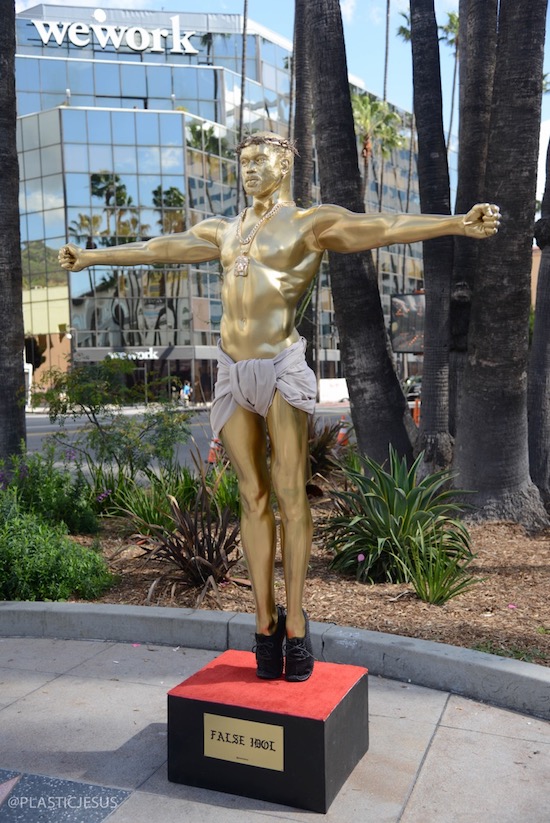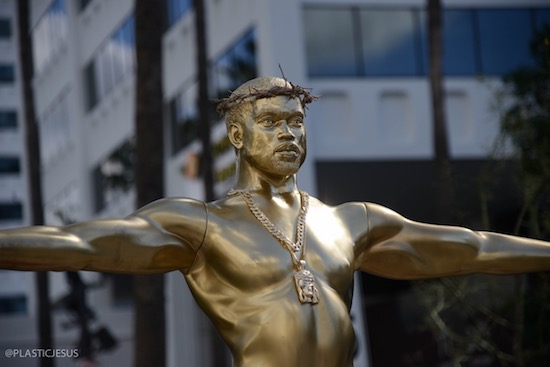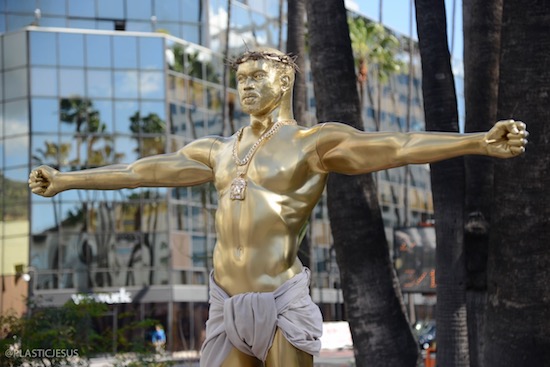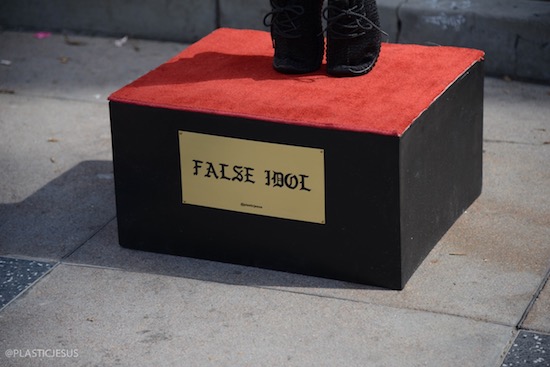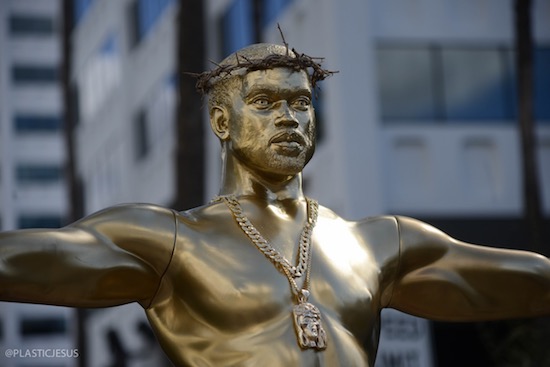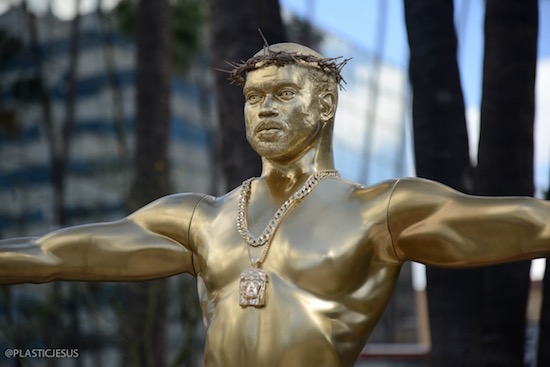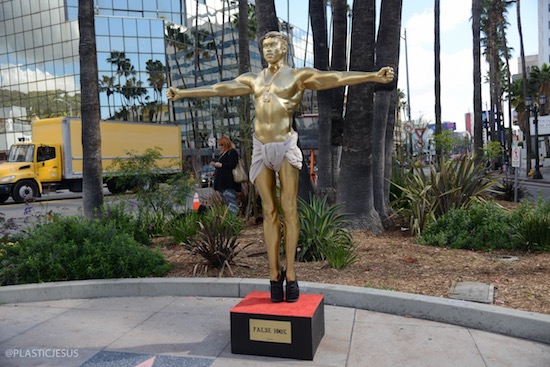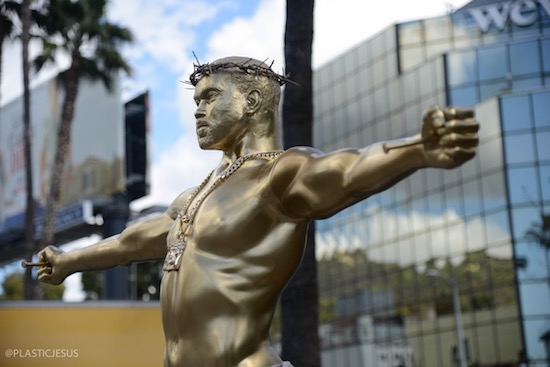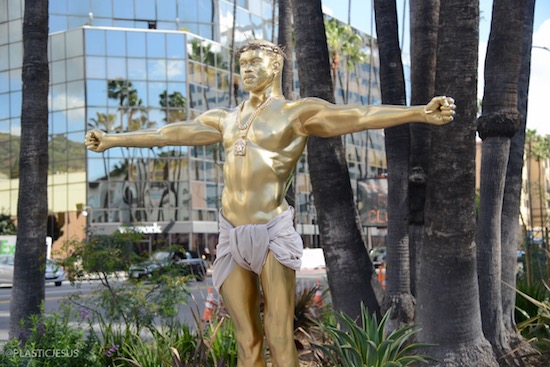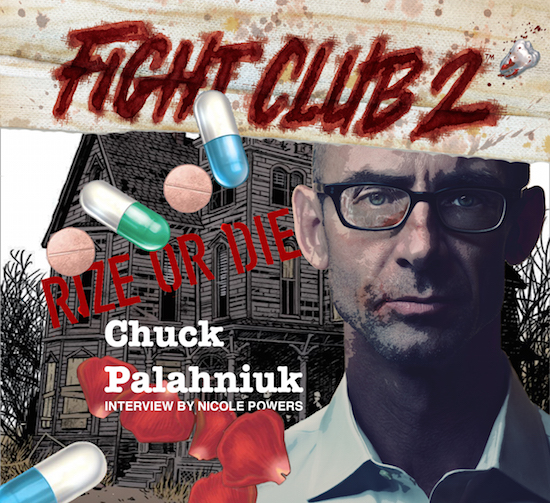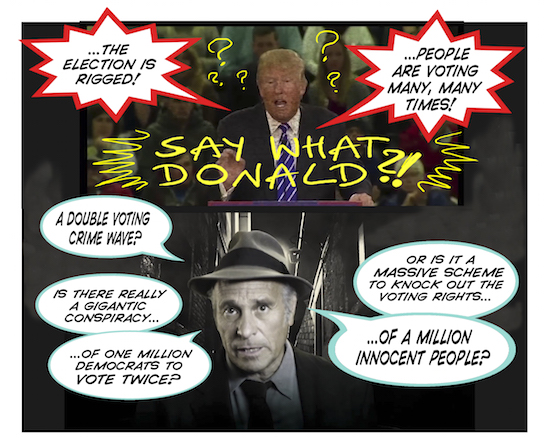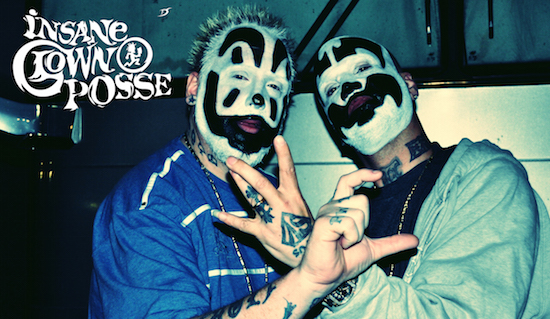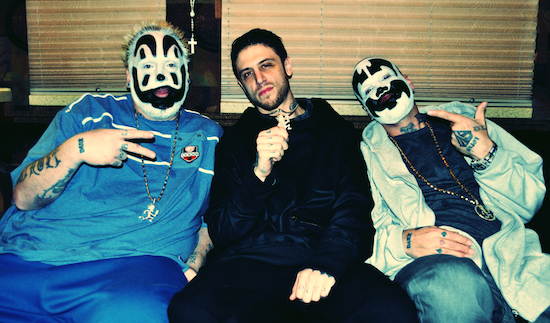
NEW SG Interview: Jean-Michel Jarre0
Posted In Activism,Art,Blog,Entertainment,Favorites,Geek,Internuts,Interviews,Music,Politics
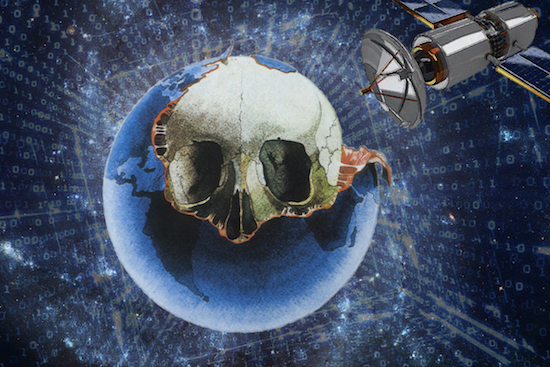
When French electronic composer and musician Jean-Michel Jarre first released Oxygene into the world, over 40 years ago, it was like a breath of fresh air. The album’s infectious melodies and counter melodies — though circuit based — ebbed, flowed and swelled in an elemental and organic way, creating a space-age symphony so lush and teaming with life that it almost single-handedly propelled electronic music from the experimental arena into the mainstream. Jarre was able to use this platform to launch a series of events in cities around the globe on a scale so large they broke numerous world records for attendance. More than concerts, these spectacular happenings combined state-of-the art production and performance technology with unique geographical backdrops, which served as a canvas for Jarre’s audiovisual wizardry.
Having sold over 80 million albums worldwide over his near half-century career, Jarre continues to be a vital creative force. He released a mammoth double album project, Electronica 1 and Electronica 2, on October 16, 2015 and May 6, 2016, respectively — the first installment of which was nominated for a grammy this year in the “Best Dance/Electronic Album” category. The tour de force work features collaborations with a wide range of artists that have both served as a source of inspiration to Jarre and have been inspired by him in turn. Notable names include Tangerine Dream, The Orb, Gary Numan, Laurie Anderson, Vince Clarke, Cyndi Lauper, The Pet Shop Boys, Peaches, Little Boots, Moby, Primal Scream, and Air, among others. However, one name among the 30 collaborators very much stands out from the rest, that of NSA whistleblower Edward Snowden whom Jarre recorded and filmed in Russia, where the former US intelligence contractor resides in enforced exile.
Following the release of Electronica 1 and 2, to mark the 40th anniversary of Oxygene, Jarre unleashed a third installment on December 2, 2016. Oxygene 3 is Jarre’s nineteenth studio album and a worthy successor to the original work, which paid homage to our mothership — Mother Earth (Oxygene 2 having been released in 1997, 20 years after the original). Continuing his unique live legacy, and again underscoring his passion and concern for the environment, Jarre has another large-scale event planned in April on the majestic mount of Masada near The Dead Sea in Israel. Though Jarre is determined that his music, as always, will take center stage, he also hopes the concert will raise awareness for the dire ecological challenges facing the region. Jarre is then set to embark on his first ever North American tour the following month. The 9-date foray will mark his first performances in the US since Rendez-vous Houston, an event staged against the city’s skyline in association with NASA in 1986 that attracted a crowd of 1.3 million people, earning Jarre an entry in The Guinness Book of Records.
I caught up with Jarre in Los Angeles to talk about the new music, the motivation behind it, his upcoming live performances, and his intriguing meeting in Moscow with Snowden. Having been nominated for a Grammy, Jarre was in town for the preceding week of festivities. Before meeting him one-on-one for this interview at a Beverly Hills hotel, I was fortunate enough to find myself in the audience for a panel Jarre had assembled on February 9 at The Record Parlor in Hollywood to discuss his Grammy-nominated work. The event featured a jaw-dropping lineup of Electronica 1 and 2 collaborators — Hans Zimmer, Gary Numan, Moby, Little Boots, and Julia Holter — and was moderated by DJ and musicologist Nic Harcourt.
Nicole Powers: It was such an honor to see the panel you had assembled the other night at The Record Parlor.
Jean-Michel Jarre: Yeah, it was really nice. Frankly, I don’t know who got this idea, but I said it would never happen because all these artists are so busy — and then everybody came along. It made me think about how this whole project came along. I wanted to gather around me for this Electronica project people who were a source of inspiration to me. I had no idea that all these artists would be interested. Everybody said yes. I ended up with 30 collaborators. It took me five years to do this project… I divided this album into two parts… because it was too long…
NP: I wanted to pick up from where the discussion left off the other night. Right at the end, you spoke about how you admired how Moby uses his platform for activism. You also spoke about how Oxygene was inspired by your thoughts on the environment. And you spoke about your mother [France Pejot], and how, even though most people associate you with your father [film composer Maurice Jarre], you’ve been very inspired by your mother’s activism… What words of advice and inspiration did she give you? What seeped in as you were growing up?
JMJ: If she was here, listening to us at the moment, she would say I was not an activist necessarily. She was not looking at herself like this… An activist is actually somebody who is following his or her convictions, socially and politically in the Greek sense of the word… You are living in the community and within this community you must try to find the most balanced way of living together and respecting justice and equality and freedom. It starts with very basic feelings, basic ideas. It’s what my mom was. She went into the French Resistance just because she couldn’t accept that… suddenly you were occupied by people who, on top of being just your enemy, waging a war, where carrying ideals which were absolutely a monstrosity — the Nazis.
I’ve been raised with this woman being very tolerant, lots of humor, very funny. She didn’t consider herself a heroine. But she’s been a real heroine. She was caught three times by the Nazis. She escaped three times — even the last time when she went into a concentration camp. The last time, it was obviously the toughest one because the Germans were losing… When they were retreating the German army took prisoners more or less like hostages through Germany, trying to escape from the allied forces. She escaped then, at that moment, into a forest like you see in a movie, going back from Berlin to Paris on the top of a train where if you fell asleep you would have your head chopped off by the tunnels. She had to do this for 1,500 kilometers…
Because my parents split up when I was 5 years old, unfortunately, I missed out on my relationship with my father. My father went to Hollywood and I grew up in Europe. I hardly saw him all of my life. We never had conflicts… It’s probably better to have an open conflict with your dad than nothing, because actually you have somebody to rebel against. The black hole or the absence is the most difficult thing, in my opinion, to cope with as a human being. We never even succeeded in talking about music during his lifetime. My mom played both roles, but she wasn’t too intrusive like a mom can be with a son when the father is not around. She’s been really an extraordinary woman. She gave me, I think, the right values that I try to transmit to my own children.
NP: The groundbreaking album that brought you to worldwide prominence, Oxygene, was inspired by your thoughts on the environment… You’ve recently released a third installment. It’s probably more important than ever that people have an awareness for, and an understanding of, the custodianship of the environment. What were you trying to say with the first album all those years ago, and what are you trying to say now with the third?
JMJ: Actually, I always considered, and still now more than ever, that our role as artists is not to transform our stage into a political platform. To say, save the Amazon, save the penguins, save the whales — I always feel a bit uncomfortable with this. But, through our music, through our lyrics, through our art forms, sharing convictions is something that has always been important to me. This is the reason why I think that Bob Dylan’s Nobel Prize is absolutely relevant, because it’s a very good example of somebody protesting… He invented the protest songs concept in folk music, but he was doing this through his art, through his lyrics, through his songs. I think this is very important.
For Oxygene, it was the same thing. I had this idea that, for me, electronic music was linked with the outdoors and space. Not necessarily outer-space. Lots of people link my music to science fiction and outer-space, which is fine, but when I did it I remember that I was more interested in thinking about landscapes, the vital space around us, the environment, rather than outer-space. Also, I always considered, electronic music should be performed outdoors. It’s the reason why I did lots of concerts outdoors, which I’m continuing to do. Also, it was very [much a precursor] to rave, to all these outdoor festivals these days — it’s linked almost with the DNA of electronic music.
To the question of environment, when I started Oxygene, at the time it was created, nobody was interested in the environment. We were considered neo-hippies and dreamers. It’s extraordinary to see that 30, 40 years later, in every political program from extreme left to extreme right, everybody is conscious about the environment — so we won in a sense.
The idea with Oxygene was to, through the music, through the graphics, through the cover, express this idea of a link with the environment. The fact that music is like oxygen and we have to take care of our environment — as we have to take care of music. I would say that — and this is another conversation — today I think intellectual property, the fact that we need to respect the value of music, is exactly the same thing as 40 years ago when we said we have to respect the environment. It’s exactly the same thing.
And talking about activism, I’m President of CISAC, which is a huge international confederation for authors and creators. For people like you and me, and all creators — photographers, filmmakers, writers, musicians, and of course, authors… It’s not a niche, this problem. In every family — I’m not talking about our generation but for the future — you have kids dreaming of becoming a photographer, a writer, a filmmaker, a musician, and he or she will probably have to abandon his or her dream because of the fact that they couldn’t make a decent living with that.
NP: Right. Everyone wants everything for free, whether you’re a photographer, writer, or musician.
JMJ: Exactly… The value of authors and creation is in danger, exactly like the Amazonian Forest. It’s exactly the same thing. That was my point.
NP: With the Electronica albums, it’s lovely to hear you taking ownership of a genre that you had a huge part in creating. One of the tracks that obviously sticks out from all the others, and this goes back to activism, isn’t a collaboration with musician or a singer, but he’s an incredibly important human being, Edward Snowden… How did the Snowden collaboration come about?
JMJ: One of the recurring themes of Electronica is this idea of this ambiguous relationship we have towards technology. On one side, we have the world in our pocket through our smart phones. On the other side, we know that we are spied on… The whole project revolves around that. The song that we did with Laurie Anderson is about this idea that lots of people are touching their smart phone more than their own partner… With Cyndi Lauper, we touched on this idea of love in the time of Tinder. And with Massive Attack, with this track called “Watching You” on the first one, it’s all about the CCTV cameras.
While I was doing this I first heard, like everybody else, about Edward Snowden. He reminded me about my mom with the idea that, again, when a country is generating ideas and actions that may harm your community, some of us have to stand up against this and try to resist. Not to harm the country, the reverse, it’s to improve your country… Snowden is a modern hero to me because he did that, he risked his life just to improve his country.
Some people in this country have the tendency to forget that this country has been founded on an act of resistance, which was considered an act of treason by the King. And every social progress in life — the abolition of slavery, abolition of prohibition, the right of votes for women, for minorities — it’s always been done against the law, against the power of that time. And what Edward Snowden is doing is actually that. He’s pointing out something that’s very dangerous for privacy and for our own identity. That’s the reason why I said he has a role in this project. I had no idea if he would accept, but then I went through The Guardian and contacted him through his lawyer, Ben Wizner…
We had our first contact in my studio through a video screen… Suddenly, boom, one moment Edward appeared. I must say that I met a fantastic young man. Lots of humor. A very honest guy. A strong guy with lots of integrity, in love with his country. I explained my project to him. He’s a big fan of electronic music. He said, yes, I would be honored to do it, but I’m an engineer… We decided that I should go to Moscow to meet with him and then I went there.
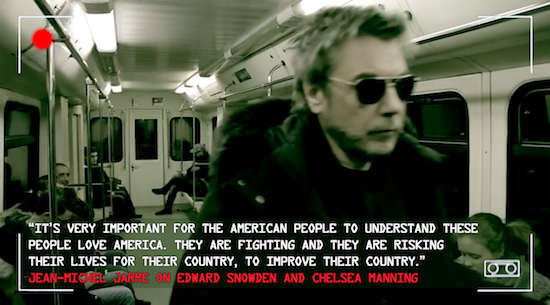
It was like a spy movie a little bit because it was quite difficult to organize everything. We spent three or four hours together where I recorded him and filmed him… We decided what this track should actually convey… What the track should be… We decided exactly the pace and the concept. We chose the title of the track — “Exit” — together… We said it should be quite a speedy techno track symbolizing this mad quest for big data that everybody has and also this mad hunt that the three biggest, most important organizations in the world — NSA, CIA and FBI — are driving against one single individual young man.
I recorded him and filmed him. His role in the track is actually, there’s a long breakdown in the middle of it where he just speaks. We took just three or four sentences on the reason why he did what he did… Why film him? Because during every concert during this tour, he is there. This track is one of the big moments of the concert — absolutely! His face, the talking head’s very strong in the middle of this crazy track, which is very, very strong visually also. It’s a very big, very important moment.
NP: Since you recorded the track we’ve had a regime change here and there’s talk of Russia trading him in as a gift to Trump. So I love the fact that you’re going to be touring America with this Snowden piece being very much the pièce de résistance of your show. It’s a very important thing to do at a very important time, especially for Snowden with his life on the line.
JMJ: I totally agree. When I started and I got the idea, I didn’t even know that Oliver Stone was preparing his movie more or less at the same time. I considered from day one how important it was for the world, for America also. And since the new election, I think it’s even more important, as you say, very truly because it’s totally crazy what’s going on in the world… Not only in America, but same in the UK with Brexit, the same in France. Next May there’s a big risk that Marine Le Pen, the extreme right leader, could win the election. Everybody says, no, no, no, it’s not going to happen, but we said exactly the same thing about Brexit. No, no, no, it’s not going to happen. We said the exactly the same thing about the [US] election. No, no, no, it’s not going to happen — and it’s happening. What does it mean, all this? It means there is a massive rejection of a lot of people that we have to respect, we have to listen to, absolutely rejecting the political elite.
In big cities all over the Western world… for the next 30, 40 years, lots of people have been abandoned, in a sense. Democracy has not been able to solve this. We have really to invent a new political system. The political system in which we grew up — all of us — is not working anymore. We have to find something different, something else. And, in a sense, if we want to see something positive in Donald Trump’s election, it’s because he’s so crazy that everybody realized, Okay, wait a minute, whether we are American or not, we have to think seriously about the reasons why we are in this situation.
And to go back to what we were saying, obviously, it’s never been so important to do this North American tour for me involving Edward Snowden’s piece. For Edward Snowden, obviously, but beyond Edward Snowden, for all the whistleblowers. We need whistleblowers, and WikiLeaks… Even if we don’t agree about what they do, all these people are trying to help everybody to open their eyes… to the people watching us… to try to get the truth between all the information we have through the media, which is constantly twisted and deformed. I think it’s very, very important.
More than ever, we need to protect people such as Edward Snowden, because they symbolize the philosophical models for the youth… These figures, such as Edward Snowden, Chelsea Manning, and some others, have to be protected and have to be promoted, their ideas. It’s very important for the American people to understand these people love America. They are fighting and they are risking their lives for their country, to improve their country.
Something incredible that Edward told me… I said, you realize you’re risking your life? He said, yes, but I’m a solider. My grandfather was a solider, my father was a solider, and I went into the CIA and the special forces because I believed and wanted to promote the values of my country. And, the more I was involved in what I was doing, the more I was concerned that I was betraying my country because I was doing exactly the reverse. So I know that I’m risking my life. I know that maybe I’ll be killed or I’ll be in jail forever. But, if it happens, somebody else behind me will do the same. And so, I have to do it. He was talking exactly like a solider. Like a hero during the war. It’s exactly the same thing.
NP: Like a member of the resistance. Like your mother.
JMJ: Exactly. That’s the reason why I’ve been so touched.
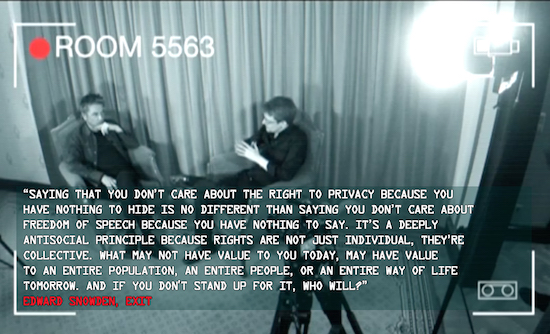
NP: You have a unique platform with the big shows that you do. I know you’ve got one coming up in Israel and another coming up in Norway with Stephen Hawking.
JMJ: Yes.
NP: Presumably, they’re going to have very different themes?
JMJ: Yes… These two are pretty different. One is close to the Dead Sea. The Dead Sea, going back to environment, is a very important ecosystem — like the North Pole or the Amazonian Forest — for the balance of the planet. And the Dead Sea is losing 1.2 meters per year.
NP: Wow!
JMJ: It means that one arm of the Dead Sea between the Israeli border and the Jordanian border, in 12 years from now, you will be able to walk [across it]… It’s a very complicated situation… Lots of people in the region are using the water of the Jordan River, using the source of the Dead Sea for their own use. Because of the demographics, there are more and more people using it. Also, you have this wild exploitation of the products of the Dead Sea for anti-aging…
This project is all about attracting and improving the awareness of the problems of this region. I’ve been a UN ambassador for the environment for UNESCO for 25 years and this is also under the label of UNESCO… Obviously, before everything, this is a concert in an extraordinary place… Masada is kind of like Ayers Rock. It’s a big rock where Herod as king built his fortress and very advanced technologically 3,000 years ago. It’s a fantastic place. The whole panorama is like playing on the moon. And because it’s 900 below sea level, it’s the only place where you have 10 percent more oxygen than the rest of the planet. So playing excerpts of Oxygene over there is quite fun.
NP: The audience members are going to get 10 percent more oxygen with their Oxygene.
JMJ: Yes… Then the project Starmus in the Northern part of Norway is linked with Stephen Hawking… It’s a seminar of astrophysicists for three, four days, and they invited me to do a concert over there. It’s going to be about black holes. Apparently, I should receive the Stephen Hawking award for innovation, then we’re going to have a Q&A and do it with Stephen Hawking on stage. Then the concert will happen. It’s going to be quite surreal and quite fun. I’ve been a big, big fan of Stephen Hawking for years. I think that if I had not done music, I would’ve tried to become an astrophysicist, or an architect maybe. But I choose music and I do this because I can’t do anything else.
NP: I love that you’re doing something within the scientific realm at this time, because there’s never been such a war on knowledge, and a war on science in particular.
JMJ: Absolutely.
NP: You’ve got the Trump Administration talking about wiping EPA data off websites and stuff.
JMJ: Exactly. And, you know, this is another form of resistance, to pay tribute to research and development. To pay tribute and give a platform, through entertainment, to people who are really the future of the planet. All these intellectuals and scientists, that a lot of people such as Donald Trump and lots of others have a tendency to push to the side, to say the least.
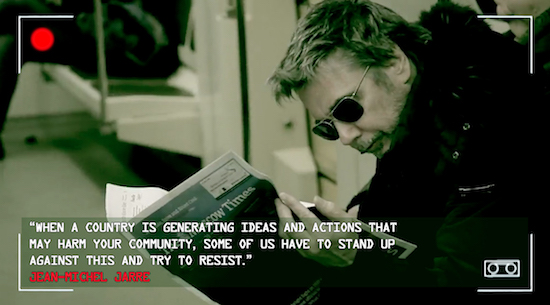
NP: It does seem that you’re becoming a little bit more vocal about the motivations behind your music… Is that the case?
JMJ: I think that it’s important to integrate the message, the conviction within an artist’s performance. For instance, doing something with Snowden in America in a concert, I think it’s probably more important than giving my opinion on my Twitter or on my social media… At the end of the day, who cares about the opinion of an artist? I don’t care about the fact that Picasso would prefer cheesecake or apple tart. I care about what he’s telling me through his painting. I feel it’s more important to promote convictions and messages through concerts, through music, through albums, because I think that is the moment where you touch people through their heart, through their emotions, and not only through their intellect… If you’re touched by an image, by sound, by music, I think this is probably stronger.
NP: Final question, because I can see we have to wrap this up. I’m a great believer in putting thoughts out into the universe because often, by doing so, they will happen if you just allow the universe to do its thing. So I want you to put a thought out into the universe about a person you’d like to perform with that you haven’t already or a place where you’d like to do a concert that you haven’t yet.
JMJ: There’s so many places… I have a strong link with Asia but, for instance, I’ve never really been to India. I would really like to go to India. And my dear friend, Arthur C. Clarke, always told me, you know, you should do a concert in space. I said, Arthur, be serious, in space? …You have no sound, because by definition you have no air so its total silence. If we talk in space, it would be like this [mimes silent talking]. So he said, yeah, but I’m sure you’ll find a way.
We had this fantastic project, it’s in the Guinness Book of World Records for the biggest concert in America, in Houston that I did a few years ago for the 25th anniversary of NASA. One astronaut was supposed to play in the weightlessness of space, Ron McNair, live from space with me on stage. Everything was ready and then the Challenger [explosion] happened, so it was a real tragedy. I wanted to stop everything and the astronauts and people from NASA told me, no, no, you have to do this concert as a tribute to the astronauts… So this is something that I always kept in mind that I would like to create, in one way or another, a link with space somehow.
I’ve been linked with space totally out of my control. I did this big concert in Moscow where I had the Mir space station cosmonauts live during the concert. It was in the days when the Mir space station was really in danger. We didn’t know if they could get back. It was quite dramatic. What really moved me so much was we had this live link and they were listening to my music. They took my music before taking off and they were listening to my music in space… You have this great 2001 shot of the earth with my music on it… All of those kind of things, obviously, are really dreams come true…
NP: Maybe when you’re next in LA, you’ll have to have a meeting with JPL in Pasadena to see if they can make something happen.
JMJ: Oh, yes.
NP: I’m sure you could talk to the JPL people.
JMJ: Yeah, that would be great. Yes, next time, that would be cool.
Jean-Michel Jarre will perform Live at The Dead Sea at Masada, Israel on April 6, 2017. His North American tour kicks off on May 9, 2017 in Toronto. For more info visit: jeanmicheljarre.com/tour
This interview has been edited for length and clarity, and is published here under Creative Commons License 4.0. It may be reposted freely with attribution to the author, Nicole Powers, and this copyright statement.


